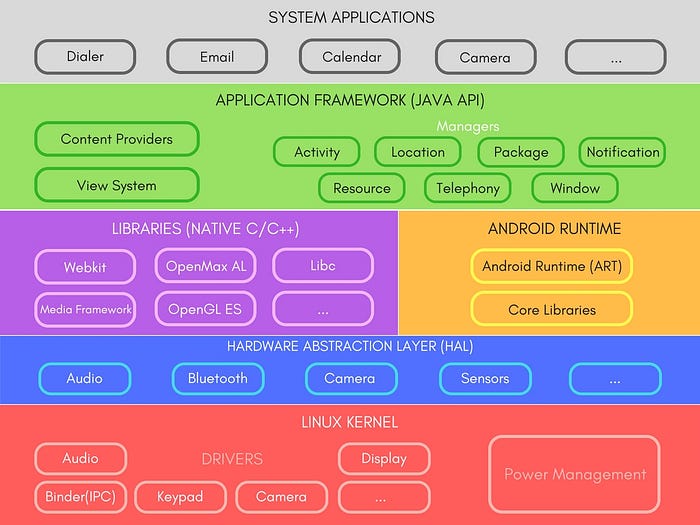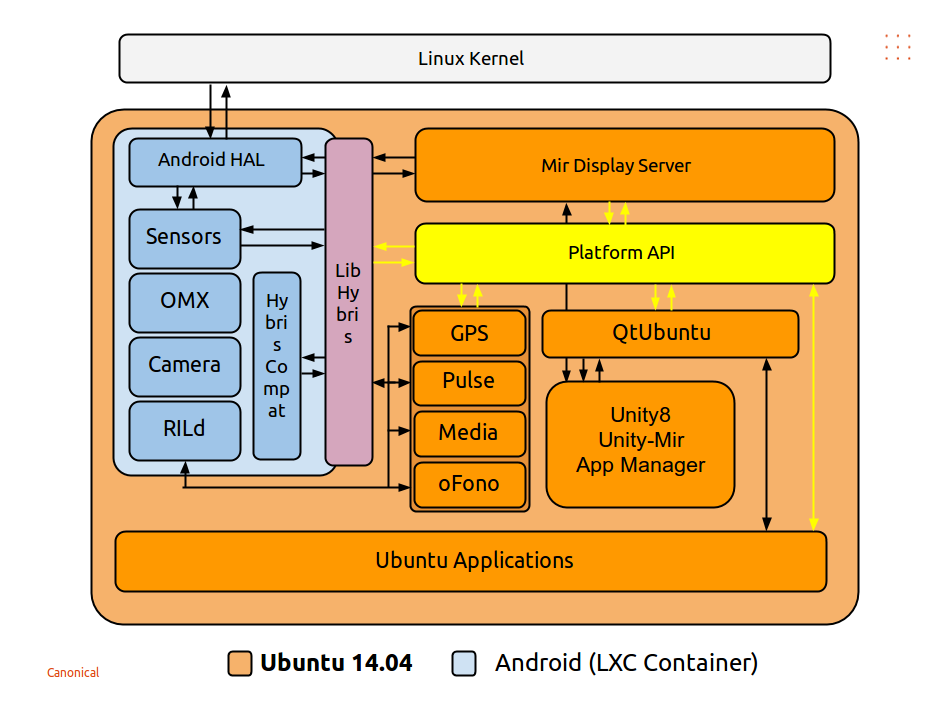FSF High Priority Projects
-
@flohack said in FSF High Priority Projects:
@libremax said in FSF High Priority Projects:
pic to answer that Replicant, as based on AOSP is free of Android trademark belonging to Google and that Replicant is also free of proprietary component because Replicant "replaces or avoids every proprietary component of the system, such as user-space programs and libraries as well as firmwares."
How can Replicant be free of proprietary firmware? Its an essential prt of every Android.compatible phone. Without it you would not be able to make calls, use Bluetooth or WiFi and see nothing on the screen. Let alone the camera...
Answers are in Replicant FAQ.
In brief, Replicant as a distribution does not include non-free components.
When used non free components "are run aside" Replicant.
To be compliant with FSF requirements for an OS distribution does not involve to be usable from its own in real life.It would be possible to make a stripped down Ubuntu Touch distribution without non-free components.
Would remain at the very least the subject of trademark to examine. -
@libremax well "run aside" is a bit vague. Purism has always pointed out that they will isolate the modem and such to not run proprietary code through the OS. But, as you need to load firmware, thats not gonna work for the existing hardware. So, how can Replicant load firmware in an FSF-compliant way?
To mee that is all very political, not a technical discussion, and what is considered FREE and what not is sometimes a matter of personal taste more than strict rules. As I am not a political animal at all, I stay clear of such discussions, but just saying, it seems Replicant sells their cause very well, letting people believe that they do not even toch non-free blobs, which is technically impossible: In order to load the firmware, it must pass the OS main processor and kernel, and as such its already "tainted".
Or I am wrong? I dont know. As already pointed out, we have Ubuntu in our name, which is a registered trademark and therefore probably not applicable for that list of projects.
-
@flohack said in FSF High Priority Projects:
@libremax well "run aside" is a bit vague. Purism has always pointed out that they will isolate the modem and such to not run proprietary code through the OS. But, as you need to load firmware, thats not gonna work for the existing hardware. So, how can Replicant load firmware in an FSF-compliant way?
You can have a look to what is explained for a "supported device" like Galaxy S2.
Proprietary firmwares which have to be loaded to the circuit by the main processor are not loaded because they are not distributed along with Replicant. So the device does not get the functionality and that's it.
To mee that is all very political, not a technical discussion, and what is considered FREE and what not is sometimes a matter of personal taste more than strict rules. As I am not a political animal at all, I stay clear of such discussions, but just saying, it seems Replicant sells their cause very well, letting people believe that they do not even toch non-free blobs, which is technically impossible: In order to load the firmware, it must pass the OS main processor and kernel, and as such its already "tainted".
Or I am wrong? I dont know.
Replicant make the choice as a distribution to not distribute non-free components.
Given that choice Replicant is unsuable for probably more than 99,99% of humans.
They are very clear it's not sufficient to resolve all freedom and privacy/security issues in the real world.And it's great Replicant exists.
-
@libremax ok so its basically PostarmetOS approach where your phone would be more like a wireless tablet/computer

-
@flohack Well, they differ on many major points, Replicant is focusing on being a free-only mobile distribution and PmOS is focusing on using mainline Linux Kernel but the result for average joe is rather similar.
-
@libremax Yeah, sounds like PostmarketOS. I didn't know Replicant is similar to that. Anyway, this means all distros for the pinephone and librem 5 are kind of qualified even UT because it doesn't use android blobs there.
Also, to me AOSP is still Android

-
Well, I think the best way to know is to candidate, or to ask someone from the FSF to come here and tell us.
-
The doctrine of the FSF has been well established and consistent for 35 years. I don't see why it would suddenly change (and I hope it will not).
-
Also, to me AOSP is still Android

There is not much risk that Google will sue you for not respecting his trademark by wrongly attributing the protected name of his proprietary operating system to a free operating system, knowing that he is the creator and sole responsible for this mess, which Google probably did on purpose and would not have billions dollars to get from a trial :-).
-
@libremax said in FSF High Priority Projects:
I don't see why it would suddenly change
That doesn't forbid to try and apply.
At worse it won't be accepted. -
So, as nobody jumped in, I did it and wrote them this email:
Hello FSF!
First of all, thank you very much for what you are doing, the world deeply need free and respectful software.
I read your call for suggestions for the HPP list and I saw the "Free phone operating system" category.
I'm a user of Ubuntu Touch for 2 years now as my primary device and I'm very happy with it, that's why I want to suggest to support that project.
I don't know what are the requierments to be accepted in the HPP list. I know (and agree with) the FSF philosophy of rejecting proprietary software. Ubuntu Touch is of course a free software project, distributed under the GPLv3. It is using Halium to be able to run on phones which requires proprietary firmwares, but is also able to run on plain GNU/Linux phones like the PinePhone, so without proprietary bits involved.
Do you think it is a good idea to include it in the list?
Freely,
Fla
We'll see what goes out of this.
-
@fla I already wrote them for another reason (make microkernel an HPP) I was only waiting to understand what is the foundation and community will about all this (so also to gain some time between the two email)
but I fear UT is not listed in the HPP because, as said by Replicant:
" Many mobile operating systems are mostly free software (e.g. Android, Firefox OS, Ubuntu Touch, Tizen), as they use the Linux kernel, a free framework and ship with free base applications. However, the user-space hardware abstraction layers are for the most part proprietary (it varies from one device to another) and they also ship with proprietary loaded firmwares for various integrated circuits. Every piece of proprietary software running on the system is a risk for privacy/security as they can offer remote access back-doors and compromise the rest of the system."
And also
" None of these mostly-free systems have a clear policy to reject proprietary software and not advocate its use, except for Replicant. "PS: are we using a user-space abstraction layer? I thought the abstraction layer was between the hardware and the kernel, so a kernel-space abstraction layer :man_shrugging_light_skin_tone:
-
@aury88 So replicant is purer than even distros oon the Pinpehone/librem 5? Does it even work and daily driver ready on some devices? I thought it's similar to /e/ and Lineage OS.
-
@aury88 you need to learn more about Android:
- While Google chose the Linux kernel and its GPLv2 license, they sonn figured out that it was taking a) much too long to get all drivers into mainline, especially since they did not want to wait until Linus and other kernel folk were happy with their ideas, and also b) hardware vendors argued that they dont want to publish their sources.
- So they found a way that most "drivers" for hardware in the Android Linux kernel are just stubs, and the real driver work happens in a closed-source userland service/daemon.
- This is when we talk about the Android container, the system.img, thats the thing that communicates with UT via libhybris.
- every Android device has one, without it you do not have sensors, GPS, Bluetooth, camera. Not even screen output.
- So its unavoidable to run those daemons. But, as much as possible, we run them in an lxc container and try to seal them off as best as we can.
-
@flohack I already know-ish almost all of these things my doubt was about the "position" of this system.img/abstraction layer
 (I though halium was covering the bottom red and blue areas in a "kernel-land"and UT was over it)
(I though halium was covering the bottom red and blue areas in a "kernel-land"and UT was over it)
I already know UT needs (as any other SO) these blobs to run on "android device".
Replicant does not seems to use these services/daemons and so their os is always missing something in any device.@kugiigi I only copy-pasted what they wrote on their website
I don't think they are purer that other distros on pinephone or librem5 and I suspect they also know that but avoid to talk about this.
-
@aury88 The old drawing still stands:

So basically Halium is only a device boot API that we developed to bring up the rootfs and init. As soon as everything is booted Halium is not needed anymore.
What most people confuse with libhybris: Thats the thing that talks to Android container and Ubuntu Touch. And thats also show in the drawing. -
@kugiigi said in FSF High Priority Projects:
@aury88 So replicant is purer than even distros oon the Pinpehone/librem 5? Does it even work and daily driver ready on some devices? I thought it's similar to /e/ and Lineage OS.
The FSF quote talks about Firefox OS, no doubt it is several years old and the situation with PinePhone and Librem 5 is different.
-
@flohack thank you! Now it is more clearer.
Now my only doubt is what is the scheme in an "open hardware" device like pinephone or librem5 and what closed source parts still have to be integrated in UT (preventing UT to be fully FSF compliant.)PS: I don't find that very informative scheme in our doc...I think that could be usefull to understand what UT is and what is/must be touched by halium and the port process. why that is not in our documentation?
-
@aury88 Well in the Pinephone we do not need the Android container and libhybris parts. They are being replaced by native access or a small API so that our userland services can be used on both Android and Non-Android phones. But I am not sure FSF will not be confused if we offer ourselves as a "dual-stack" solution that runs sometimes on an open platform, sometimes not.
-
@flohack The FSF doesn't like any sort of closed source anywhere in the project...they don't recommend Debian just because it has a non-free repo and documentation.